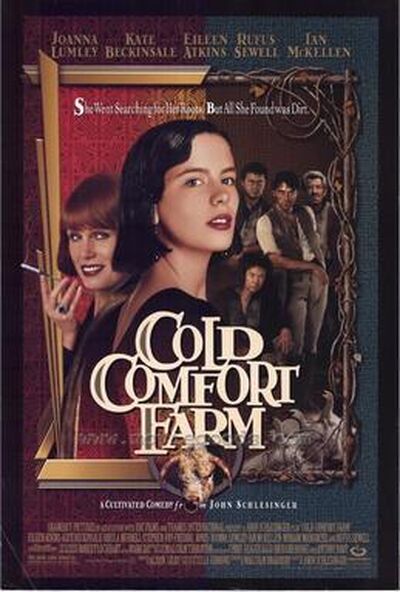In the Woodshed
Cold Comfort Farm
By John Schlesinger & Malcolm Bradbury

6 Feb, 2025
John Schlesinger and Malcolm Bradbury’s 1995 Cold Comfort Farm is a period-piece movie, a comedy based on the Stella Gibbons’ 1932 novel of the same title. Cold Comfort Farm features many actors now stars, Kate Beckinsale, Joanna Lumley, Ian McKellen, and Rufus Sewell among them. I suspect that many weren’t as well known in 1995 as they are now.
Orphaned, having inherited only enough £ for a meager allowance, Flora Poste decides not to look for job and puts off marrying her eminently suitable suitor, Charles. Instead, she seeks out relatives off whom she can sponge. The least unpromising kin are the Starkadders, who live in Howling, in far-off Sussex. Off to Sussex Flora goes.
Flora arrives at Cold Comfort Farm and discovers, not only a run-down property, but a miserable, dysfunctional household. Each of her relatives has a Problem for which they can see no possible solution. Ruling the estate with an iron fist: Aunt Ada Doom, who is determined that no Starkadder should ever escape Cold Comfort and that no significant change should ever occur.
The village of Howling isn’t entirely bereft of culture: there are gentry (the Hawk-Monitors) and one intellectual (the unctuous, libidinous, Mr. Mybug, played by Stephen Fry). But this tinge of culture is more of a drawback than an asset; the loathsome Mybug is immediately infatuated with Flora. She must fend off his oily advances all throughout the film.
Flora sees that if one’s current circumstances result in a Problem, then the solution is to change one’s circumstances. Flora is worldly enough, well-connected enough, relentless enough to ensure that each Starkadder is steered towards more satisfactory endeavors. That could be marrying a Hawk-Monitor of good character and little wit, becoming a nomadic missionary, embracing a film career, or acquiring a farm management role commensurate with one’s previously underappreciated skills.
This leaves only the matter of Aunt Ada, who has gloried in her traumatized misery for decades and sees no pressing reason to abandon it now. Has Flora met her match?
~oOo~
The movie was envisioned as an inter-war period piece, not the faintly science fictional setting of the novel. The director decided to do without air taxis, the Anglo-Nicaraguan War, videophones, and suchlike. That setting has virtually no relevance to the plot and would have increased production costs. Cost considerations may also explain why none of the cows shed horns, tails, or legs, as they did in the novel.
As mentioned above, the 1995 television film is crammed with familiar names. To steal outrageously from Wikipedia:
- Kate Beckinsale as Flora Poste
- Joanna Lumley as Mrs. Mary Smiling
- Ian McKellen as Amos Starkadder
- Rufus Sewell as Seth Starkadder
- Eileen Atkins as Judith Starkadder
- Sheila Burrell as Ada Doom
- Stephen Fry as Mybug
- Freddie Jones as Adam Lambsbreath
- Miriam Margolyes as Mrs. Beetle
- Ivan Kaye as Reuben Starkadder
- Jeremy Peters as Urk
- Maria Miles as Elfine Starkadder
- Christopher Bowen as Charles Fairford
- Louise Rea as Meriam Beetle
- Sophie Revell as Rennet
- Rupert Penry-Jones as Dick Hawk-Monitor
- Angela Thorne as Mrs. Hawk-Monitor
- Harry Ditson as Earl P. Neck
Filming a novel is always difficult. While a novelist can count on readers to fill in the background given a few evocative words, a film has to actually show the setting. Schlesinger, the director, did this very well. I note, for example, how run-down Cold Comfort is when Flora arrives and how spruced up it is by the time she leaves.
Kudos to the casting director for selecting actors willing to enthusiastically, shamelessly chew the scenery. Beckinsdale’s Flora, being the sensible one, has the least scope for theatrical excess. The other actors play considerably less constrained characters, and take full advantage. Brian Blessed himself would have been impressed.
Something I noticed rewatching Cold Comfort Farm that may explain the dismal state of the farm when Flora arrives: many of the characters strike dramatic poses around the farm, but almost nobody does actual farmwork. I wondered if this was because nobody involved in the film had any idea what farmwork looks like. I am pretty sure that Gibbons didn’t, preferring to invent colorful farming terms on the fly. As we do see Reuben Starkadder laboring on the farm, I am inclined to think this curious absence is characterization. Almost nobody does productive labor because they are too busy being dramatically troubled.
A minute of film time is roughly one page of text, so a 95-minute film of an approximately 200-page novel has to leave out about half the novel. This would be tricky. It would be too easy to leave out the wrong half. In this case, script-writer Malcolm Bradbury had a keen eye for what was important and what was not. Someone viewing the movie who had read the book wouldn’t be left with the impression that swathes of the book had been dropped, but rather that the book had been efficiently compressed.
Result, an enjoyable, extremely quotable comedy film.
I am not really sure where people buy movies these days. The Cold Comfort Farm DVD seems to be out of production. I see it is streaming on Fandango, whatever that is. I recommend tracking down the DVD.
